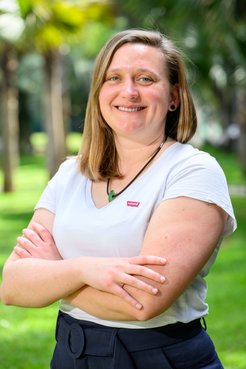Dr. Lena Molitor
Minerva Postdoc Fellow at the Weizmann Institute of Science in Rehovot, Tel Aviv

Can you briefly describe what you are exactly doing with your Minerva Fellowship in Israel, how long have you been there and how long will your fellowship continue?
In the course of my Postdoc at the Weizmann Institute in the departments of Molecular Genetics and Molecular Neuroscience, we are developing a new deep learning method to map the detailed structure and localization of organelles in human brain cells. It's especially useful for observing how brain cells respond to stress or genetic changes linked to neurodegeneration. This innovative technique offers valuable insights into brain cell function and the impact of diseases.
I have been in Israel for 2.5 years now and finish my Minerva Fellowship this summer.
How did you experience October 7 last year and what happened in the weeks that followed?
Early morning of October 7, rocket alarms went off unexpectedly. We were all in holiday mode and the rocket warning app hadn't alerted us - something that had never happened before. The bunkers weren't even unlocked yet, which was very unusual. Later, I realized that even my Israeli colleagues, who usually remain calm during rocket alarms, were completely shocked. In the evening while in our building's bunker, the walls were shaking. A rocket had landed just 300 meters away, and the Iron Dome hadn't intercepted it. It was quite frightening. We were luckily able to fly home on the morning of October 8. The Minerva team responded immediately and communicated with us, even before we departed. Later, also Weizmann offered both financial and emotional support through the Weizmann Support System.
What impact did the events have on your academic work in the weeks immediately following the attack?
For the next two or three weeks, nothing happened in the lab. But soon after, my boss encouraged us to resume work to help us return to a sense of normalcy. I returned in January 2024 after spending 2 months in a collaborating lab in Munich that thankfully allowed me to continue my research there. Now some of my colleagues are still in military service but apart from that my research continued as before.
When did you return to Israel?
January 7, 2024.
How was your return there? Have expectations and ideas (whether positive or negative) that you may have had beforehand been confirmed?
When I came back in January there were barely any attacks on central Israel anymore. Therefore the situation in Tel Aviv and Rehovot felt more or less like before, while the overall atmosphere was fundamentally changed. I think I expected to feel more of the conflict but it is actually possible to live a relatively normal life in central Israel. While this is positive, the continuous fear of further escalations and additional situations like the Iranian attack on central Israel make it mentally still very difficult to live a normal life. Also fearing for my colleagues and friends who are in military service is unsettling as well as thinking of the situation of people in Gaza. All of this makes living here more difficult despite most things being normal superficially.
What is it like to pursue your own research in Israel on a day-to-day basis? What influence do the armed conflicts in the Gaza Strip have on everyday academic life in Israel and thus possibly also on your research?
So far I have not seen major differences in our research compared to before October 7, 2023 except for some of my colleagues being in military service.
The growing worldwide criticism of Israel's actions in the Gaza conflict and the associated protest movements, combined with an increase in anti-Semitic tendencies, are also having an increasingly noticeable impact on Israeli science: Scientific collaborations with Israel are being terminated or avoided, international researchers are leaving the country. Do you also encounter such developments as a researcher who is currently in Israel and conducting research there?
I see many international students leaving the Weizmann Institute due to the conflict and very few new internationals are coming to Israel. In addition, many students are planning to leave as soon as their projects/ degrees allow. I hear people talk about boycotts but have not experienced any nor heard of any in my surroundings, this might be very different when asking more senior staff.
On a personal level: How do you deal with the fact that it is currently uncertain how the crisis-ridden situation in Israel - both in terms of domestic and foreign policy - could change dramatically at any time and thus also upset your research plans?
I decided to leave Israel this summer and I am preparing for that. This has many reasons, one of them being the war.
Regardless of the developments in Israel since last October, could you tell us a nice anecdote and a rather difficult anecdote about your Minerva Fellowship and your time in Israel in general?
The Weizmann Institute boasts an incredible international community that warmly welcomes new members. Over the years, I've had the pleasure of meeting many creative and fascinating individuals, and I greatly value these conversations. On a personal note, I met my partner here, making us a true Weizmann couple.












